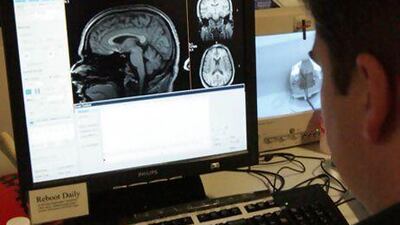Before reading any further, choose a colour: red or black?
Now consider how little you know about the decision you just made. Of course, you know which colour you decided on. But that's about it: the inner, mental processes that ended up with that choice are unknown to you, although the choice was yours. We make countless, similar micro-decisions every day, yet the fundamental nature of decision-making remains a mystery to us.
That is, until recently. In the past few years, the brain activity that occurs when we make a decision has gradually become less opaque. And now, various scientists have made claims that are variants on the same theme: they can discern what people are thinking and even predict their future behaviour, simply via brain scan.
Last week, the neuroscientist Kent Kiehl of The Mind Research Network in New Mexico announced that fMRI scans were able to predict, with a high degree of accuracy, which among 96 US prisoners would go on to reoffend within four years of release. Kiehl and his team studied the anterior cingulate cortex of the brain - the part associated with impulse control - and found that prisoners with low activity in this brain region were 2.6 times more likely to be arrested for violent crimes and 4.3 times more likely to be arrested for non-violent crimes.
The findings immediately drew (somewhat predictable) comparisons with the Philip K Dick short story, and later film, Minority Report, in which police are able to discern which citizens are about to commit murder and so "pre-arrest" them before they do so.
But the intriguing results don't end there. Scientists at Cornell's College of Human Ecology recently assembled 19 test subjects and told them about four different fictitious personalities. They then asked the subjects to think about one of the four personalities. When they scanned their brains, they discovered it was possible to discern which personality the test subject was thinking about: each personality had its own brain activity signature that was impossible to miss. Or, to put it more simply, the Cornell scientists could read a test subject's thoughts via a brain scan.
These developments in brain scan technology bring with them some fascinating, and potentially scary, questions. We're learning more about the neurological basis of decision making and thought itself. But if a decision is merely the firing of a certain set of neurons in a certain way, can an individual really be said to have "made" a decision?
Take the US prisoners whose brain scans reveal that they are likely to reoffend. If their aberrant behaviour can be reliably predicted years in advance via a brain scan, can we really hold them responsible for it? Should we offer treatment to those who step outside society's norms, rather than punishment? And if we follow that path, does the whole notion of free will and responsibility for one's actions fall apart?
Mind-reading brain scans surely have implications for the rest of us, too. Will job interviews one day be replaced with pre-job brain scans? What about marriage: could an fMRI predict how likely you are to cheat on your beloved spouse?
The implications of our new power to see and understand thought processes at work are only just emerging. But soon enough, the inside of your head may be a rather less private place than it used to be.
David Mattin is lead strategist at www.trendwatching.com
For more trends go to www.thenational.ae/trends
Follow us
Follow us on Facebook for discussions, entertainment, reviews, wellness and news.

